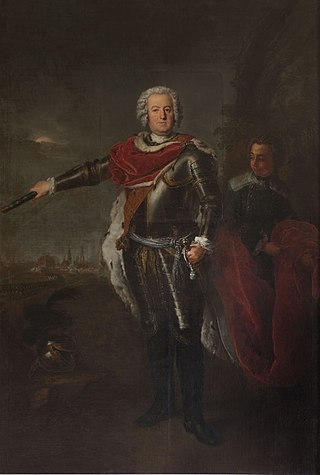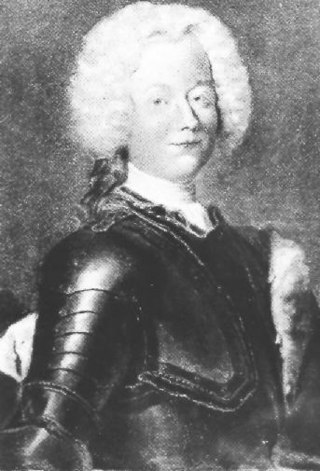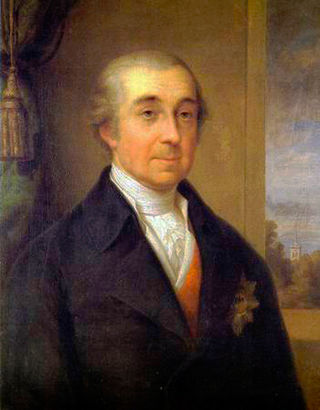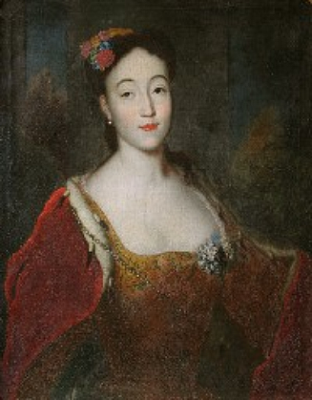
Leopold I, Prince of Anhalt-Dessau was a German prince of the House of Ascania and ruler of the Principality of Anhalt-Dessau from 1693 to 1747. He was also a Generalfeldmarschall in the Prussian Army. Nicknamed "the Old Dessauer", he possessed good abilities as a field commander, but was mainly remembered as a talented drillmaster who modernized the Prussian infantry.

Leopold II Maximilian, Prince of Anhalt-Dessau, was a German prince of the House of Ascania and ruler of the principality of Anhalt-Dessau from 1747 to 1751; he also was a Prussian general.

Leopold of Anhalt-Köthen was a German prince of the House of Ascania and ruler of the principality of Anhalt-Köthen. Today, he is best remembered for employing Johann Sebastian Bach as his Kapellmeister between 1717 and 1723.

Leopold I of Lippe was a Prince of Lippe.

Brandenburg-Schwedt was a secundogeniture of the Hohenzollern margraves of Brandenburg, established by Prince Philip William who took his residence at Schwedt Castle in 1689. By appanage, they administered the manors of Schwedt and Vierraden on the Oder river as well as Wildenbruch in Pomerania. Though prosperous, the cadet branch never obtained Imperial immediacy.

Emmanuel Lebrecht of Anhalt-Köthen, was a German prince of the House of Ascania and ruler of the principality of Anhalt-Köthen.

Augustus Louis of Anhalt-Köthen, was a German prince of the House of Ascania and ruler of the principality of Anhalt-Köthen.

Leopold III Frederick Franz, Duke of Anhalt-Dessau, known as "Prince Franz" or "Father Franz", was a German prince of the House of Ascania. From 1751 until 1807 he was reigning prince of the Principality of Anhalt-Dessau and from 1807 the first Duke of the Duchy of Anhalt-Dessau.
William Gustav of Anhalt-Dessau was a German prince of the House of Ascania and heir to the principality of Anhalt-Dessau.

Casimire of Anhalt-Dessau was a princess of Anhalt-Dessau by birth and the Countess of Lippe-Detmold by marriage.

Marie Leopoldine of Anhalt-Dessau was a princess of Anhalt-Dessau by birth and by marriage Countess of Lippe-Detmold.

Simon August, Count of Lippe, ruled the Principality of Lippe-Detmold from 1734 until 1782.

Henrietta Catherine Agnes of Anhalt-Dessau was a princess of Anhalt-Dessau by birth, Dean of Herford Abbey and by marriage Baroness of Loën.

Anna Luise Föhse, Princess of the Holy Roman Empire was a German imperial princess. Born as a commoner, she married Leopold I, Prince of Anhalt-Dessau and was later ennobled by Leopold I, Holy Roman Emperor.

Eleonore Wilhelmine of Anhalt-Köthen was a princess of Anhalt-Köthen by births and by marriage successively Princess of Saxe-Merseburg and Duchess of Saxe-Weimar.

Gisela Agnes of Rath was Duchess of Anhalt-Köthen by marriage from 1698. In 1694, she was created Countess of Nienburg. From 1704 to 1715, she was regent of Anhalt-Köthen for her underage son.

Frederica Henriette of Anhalt-Bernburg was a member of the House of Ascania and Princess of Anhalt-Bernburg by birth and a Princess of Anhalt-Köthen by marriage.

Agnes Wilhelmine von Wuthenau, Countess of Warmsdorf was a German noblewoman and the first wife of Augustus Louis, Prince of Anhalt-Köthen.

Louise Charlotte Friederike, Princess of Anhalt-Köthen was a member of the Danish royal family and the consort of Karl George Lebrecht, Prince of Anhalt-Köthen.
This page is based on this
Wikipedia article Text is available under the
CC BY-SA 4.0 license; additional terms may apply.
Images, videos and audio are available under their respective licenses.


















